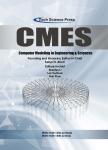Effective Elastic Properties of 3-Phase Particle Reinforced Composites with Randomly Dispersed Elastic Spherical Particles of Different Sizes Dedicated to Professor Karl Stark Pister for his 95th birthday
作者机构:Civil Engineering and Construction Engineering ManagementCalifornia State UniversityLong BeachCA 90840-5101USA Civil and Environmental EngineeringUniversity of CaliforniaLos AngelesCA 90095-1593USA
出 版 物:《Computer Modeling in Engineering & Sciences》 (工程与科学中的计算机建模(英文))
年 卷 期:2021年第129卷第12期
页 面:1305-1328页
核心收录:
学科分类:08[工学] 0805[工学-材料科学与工程(可授工学、理学学位)] 080502[工学-材料学]
基 金:This work was in part sponsored by the 2015-2016 California State University Long Beach Research Scholarship and Creative Activity(RSCA)Award
主 题:Particle reinforced composites micromechanics spherical particle interactions ensemble volume average homogenization probabilistic spatial distribution higher-order bounds multiscale
摘 要:Higher-order multiscale structures are proposed to predict the effective elastic properties of 3-phase particle reinforced composites by considering the probabilistic spherical particles spatial distribution,the particle interactions,and utilizing homogenization with ensemble volume average *** matrix material,spherical particles with radius a1,and spherical particles with radius a2,are denoted as the 0th phase,the 1st phase,and the 2nd phase,***,the two inhomogeneity phases are different particle sizes and the same elastic material *** higher-order(in ratio of spherical particle sizes to the distance between the centers of spherical particles)bounds on effective elastic properties of 3-phase particle reinforced proposed Formulation II and Formulation I derive *** a special case,i.e.,particle size of the 1st phase is the same as that of the 2nd phase,the proposed formulations reduce to 2-phase *** theoretical predictions demonstrate excellent agreement with selected experimental *** addition,several numerical examples are presented to demonstrate the competence of the proposed frameworks.



